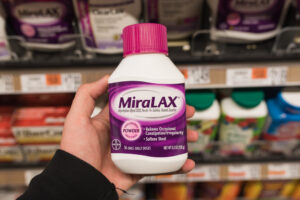What's On This Page?
ToggleLaxatives are intended to stay in the gut, however, some can affect the central nervous system indirectly by impacting electrolyte balance or stripping away the body’s natural gut microflora.
One in particular called MiraLAX® (PEG 3350) is an “osmotic” laxative. It draws water into the colon which softens the stools and stimulates peristalsis and ultimately a bowel movement. Like all other osmotic laxatives, it has the potential to mildly alter electrolyte balance in the bloodstream, although that effect is rare if it is used properly according to label directions.
MiraLAX® is FDA-approved to treat constipation in adults only and is only supposed to be used for a week. It is recommended for opiate-induced constipation in adults. See below for more on opiates. In a short time frame like these scenarios, you should not experience any untoward effects.

But what if you took laxatives for several months? What if you gave an adult-only drug to a small child? What if your doctor told you to keep taking it beyond a week?
Overusing, misusing, or abusing laxatives is common and leads to unwanted side effects. The electrolytes that were in homeostasis in the bloodstream become altered unnaturally when laxatives are used chronically.
The FDA has received REPORTS of behavioral changes over the years, especially in children taking PEG 3350. These include agitation and aggression and other behavioral issues. There was an ARTICLE in the New York Times about it back in 2015 and also THIS PAPER discussed it in the New England Journal of Medicine. The relationship between PEG 3350 and these side effects hasn’t been formally tied together with a clinical trial. It’s what’s called “anecdotal” and these types of laxatives remain popular all over the world.
But it’s so weird with a laxative, and may make you wonder: Are psychiatric/emotional problems even possible from something that works in the gut?
Yes of course, when you are impacting the water-to-mineral balance with any drug it may cause the following metabolic and microbiome changes in any person, which can cause dozens of problems. Laxatives notoriously cause these four problems:
- Hypokalemia – low potassium in the blood
- Hyponatremia – low sodium in the blood
- Hypermagnesemia – high magnesium in the blood
- Gut problems – the destruction of healthy gut microflora
Symptoms from these electrolyte imbalances may cause headaches, teary eyes, depression, anxiety, aggression, confusion, dizziness, muscle cramps, nausea, and more. Part of the problem is that laxatives are flushing things out of you including your gut microflora! That’s not good long-term because poor probiotic status causes low GABA and B12, and that alone may lead to emotional problems and even more gut problems than you started with.
Opiates and Laxatives
Opiates, a class of drugs that include medications such as morphine, oxycodone, and fentanyl, which are used to treat pain, can also cause constipation as a side effect.

If you have to take opiates due to chronic pain conditions, just be aware of this issue and keep Pedialyte® on hand, or get routine saline drips, preferably with a glutathione push of 500mg. There are now walk-in IV “hydration bars” available in almost every state, and maybe there is one local to you. You can ask your doctor about these types of places too, and see if they offer IV hydration drips there, such as a Meyer’s Cocktail.
Suppose you are taking a laxative or any other medication and suspect that you may have developed psychiatric symptoms or new behavioral problems including rage, restlessness, depression, or anxiety. In that case, it’s important to stop taking the medication and seek proper medical attention. Your healthcare provider can run tests to determine the cause of your symptoms and recommend the appropriate treatment.
6 Tips to Using Laxatives Safely
- Do not take laxatives longer than the label states, follow directions
- Stay hydrated by drinking water or Pedialyte® which will help restore some balance to your potassium and other electrolytes
- Drink enough fluids each day while taking this medication in order to offset dehydration and electrolyte imbalances
- Don’t combine laxatives
- Take a probiotic to restore gut flora
- Change your diet so you won’t be so reliant on laxatives
What about Magnesium?
Magnesium is useful for muscle pain and heart rhythm as well as headaches and a happy mood. But many people take magnesium supplements that don’t work for any of those things – they are strictly laxatives. They will take certain magnesium supplements for years and years thinking it helps with depression or osteoporosis but the magnesium type you take matters and some of them don’t get to your brain or your bones, they don’t leave the gut.

That’s because most types of magnesium supplements that you buy at the store are actually laxatives even though the bottle label just says “Magnesium.” How would you know? You’d have to read THIS ARTICLE to see if you are taking the right type of magnesium for your specific need.
See a gastroenterologist and do the tests required to determine the root cause. An endocrinologist can test you for hypothyroidism, an overlooked but primary reason for chronic constipation. Laxatives are not intended for long-term use, or for children.

Suzy Cohen, has been a licensed pharmacist for over 30 years and believes the best approach to chronic illness is a combination of natural medicine and conventional. She founded her own dietary supplement company specializing in custom-formulas, some of which have patents. With a special focus on functional medicine, thyroid health and drug nutrient depletion, Suzy is the author of several related books including Thyroid Healthy, Drug Muggers, Diabetes Without Drugs, and a nationally syndicated column.


